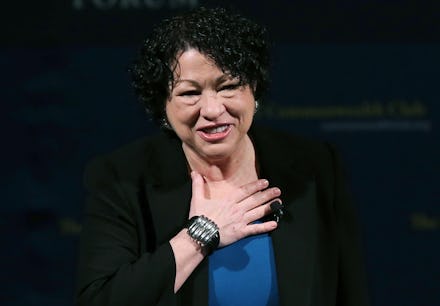In One Quote, Sonia Sotomayor Sums Up What's Wrong With Unreasonable Search and Seizure

In a blistering dissent released Monday, Supreme Court Justice Sonia Sotomayor railed against unwarranted search and seizure.
Joined by Justices Ruth Bader Ginsberg and Ellen Kagan, Sotomayor broke from the majority in a 5-3 ruling that found evidence resulting from an illegal police stop was admissible in court. Quoting Ta-Nehisi Coates, Michelle Alexander and James Baldwin, Sotomayor explained the danger of allowing institutions to violate the Fourth Amendment.
"This case tells everyone, white and black, guilty and innocent, that an officer can verify your legal status at any time," Justice Sotomayor wrote. "It says that your body is subject to invasion while courts excuse the violation of your rights."
Sotomayor continued:
"It implies that you are not a citizen of a democracy but the subject of a carceral state, just waiting to be cataloged. We must not pretend that the countless people who are routinely targeted by police are "isolated." They are the canaries in the coal mine whose deaths, civil and literal, warn us that no one can breathe in this atmosphere."
In 2006, Utah Narcotics Detective Douglas Fackrell stopped Edward Strieff Jr. without probable cause. Fackrell subsequently found Strieff had an outstanding warrant, then checked him for contraband. He found methamphetamines, resulting in a drug possession charge.
Sotomayor passionately pointed out how illegal searches disproportionately target people of color.
As New York Daily News columnist Shaun King pointed out, Sotomayor took a valiant stand for families of color that have dealt with illegal searches and seizures. Similar police procedures like the stop-and-frisk program in New York City created an uproar when whistleblowers revealed that the NYPD targeted Hispanics and African-Americans.
Sotomayor referred to Ta-Nehisi Coates' Between the World and Me and Michelle Alexanders' New Jim Crow Law as she described the impact of discriminatory searches and seizures on children of color.
"For generations, black and brown parents have given their children 'the talk' — instructing them never to run down the street; always keep your hands where they can be seen; do not even think of talking back to a stranger — all out of fear of how an officer with a gun will react to them."
Mic drop.
Read More: